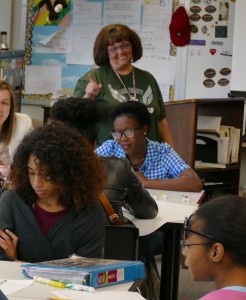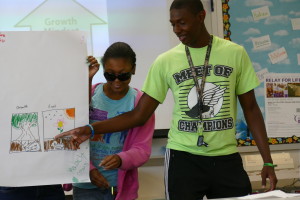Your Brain is Like a Muscle: Teaching Growth Mindset in a Delaware Classroom
I recently had the chance to sit in on Mt. Pleasant High School teacher (and Rodel Teacher Council member) Robyn Howton’s class. She presented a lesson on growth mindset to students in Mt. Pleasant’s AVID program. The lesson was developed by Khan Academy and Stanford University’s PERTS research center, with some tweaks by Robyn to suit her students.
You may be wondering what growth mindset is. Take a look at the video below from the lesson itself to get a sense of how growth mindset and neuroplasticity work together to help us learn:
So, growth mindset—the belief that people can continually grow and get better at new skills—is a critical factor in school. The lesson Robyn presented is intended to guide students in thinking about their own thinking and learning, which was a new experience for some of them, especially in terms of sharing and discussing examples from their own lives.
By the end of the lesson, Robyn’s students were presenting mini posters depicting symbolic “growth” and “fixed” mindsets. For example, the poster below illustrates the growth mindset as a robust tree with a seed saying, “I can be anything!” while the fixed mindset illustration is a small seed saying, “I will never grow.”
Growth mindset has several implications for students and teachers. Here are a few that surfaced during Robyn’s lesson:
- For students: It’s okay to struggle with a difficult concept, skill, or subject area. Many students spoke about how much more they learned when they really had to work hard to understand something.
- For students: Be thoughtful and strategic about how to get help. Students brainstormed times in their lives when they struggled to learn something, and what they did to overcome those challenges. They shared common themes about how they sought out additional help from teachers, parents, coaches, and peers to study, practice, watch, listen, and write their way to understanding.
- For teachers: Grading practices. Robyn mentioned that, after learning more about growth mindset in the past couple of years, she has stopped putting grades on students’ English papers, hoping instead that they will pay closer attention to the comments. Students who want to see their grades can log onto Schoology to view them, but the emphasis is on the feedback for students.
- For teachers: Report card comments. Robyn shared with the class that now she does not use report card comments such as “Student has natural skill and ability in this subject area,” preferring instead comments that emphasize students’ effort and determination to learning new skills and concepts.
Thanks to Robyn and her students for letting me sit in on such an inspiring lesson! If you’re interested in learning more about growth mindset, check out the book Mindset: The New Psychology of Success by Dr. Carol Dweck.

